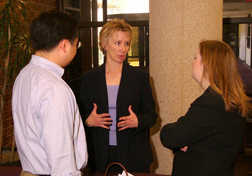 |
Pam Bataillon, assistant dean of administration, UNMC College of Nursing, center, talks with Paul Kong, Sen. Hagel’s health aide, left, and Jenn Roberts, Rep. Terry’s health aide. |
Paul Kong, Nebraska Sen. Chuck Hagel’s health aide, and Jenn Roberts, Rep. Lee Terry’s health aide, discussed the political process with students. Pam Bataillon, assistant dean of administration, UNMC College of Nursing, arranged the visit.
“Our elected officials receive a large volume of correspondence from constituents every day,” Bataillon said. “They are very busy so it’s important to know how to communicate with them effectively.”
One-page, tightly crafted memos are helpful. The memos should include: why the issue is important to Nebraska, background, opponents and proponents, and the desired action. E-mail is the best way to communicate, they said.
UNMC College of Nursing Graduate Assistant Heidi Keeler was impressed with what she learned during the visit.
“I was very excited for the opportunity to visit with Paul and Jennifer,” Keeler said. “It’s imperative that nurses learn the legislative process and become involved with political issues that directly affect the profession.
“The visit was a perfect opportunity to educate students and provide insight on effective methods in which to communicate professional needs to our policymakers. I recognize the magnitude of information legislative offices have to process,” she said.
Sen. Nelson discusses Nurse Reinvestment act
 |
UNMC College of Nursing nursing student Rosa Weatherley with Sen. Ben Nelson. |
Nelson, who co-sponsored the law that provides additional federal funding for nursing education and workforce development programs, recently asked Senate appropriators for $175 million for the Nurse Reinvestment Act.
The act would provide funding to assist universities in attracting, retaining and graduating doctorally-prepared nurses to fill faculty positions. Last year, schools of nursing across the nation turned away more than 30,000 qualified students due to the shortage of faculty members.